
Sustainability is becoming a more common topic in the event-planning process, prompting venues to devote more resources to providing and tracking “green” solutions. That’s just one of the findings of the 2016 Green Venue Report prepared by Greenview, a sustainability consulting and research firm. The report is based on an online survey conducted in July that drew responses from 44 venues around the world, all of which hold a green certification or accreditation. Most of the respondents—29—are from the United States, including the Jacob K. Javits Convention Center, Sands Expo and Convention Center, Walter E. Washington Center, and Orange County Convention Center.
“Responding centers indicated that 34 percent of event organizers discuss sustainability when engaging with the venue, up from 20 percent when we first did this in 2012 and 27 percent in 2014. That’s a really positive growth trend,” said Amanda Simons, program manager at Greenview.
To meet that need, venues are creating “green teams” comprised of staff from a variety of departments such as operations, marketing, catering, sales, and more. Eighty-four percent of respondents indicated their venue has such a team, up from 77 percent in the prior report, and Simon says this team approach can help a venue be strategic about implementing sustainability and providing solutions for planners.
“Green events happen in green venues,” Simons said. “If there is a point person at the venues, that can help the event organizers so they don’t have to go it alone.”
Examples of services venues can provide include impact reports that detail how much water and energy an event used and how much waste it generated. Nearly all of the respondents provide these types of reports; less common is a measure of the carbon footprint of an event—only nine percent of responding centers track carbon footprints on a regular basis. Simons also suggests planners look for venues that have strong ties with nonprofits in their communities, so they can help planners connect with organizations who want to receive donations of food and materials.
Sustainability trends detailed in the report include an increase in the amount of centers using on-site renewable energy sources, such as photovoltaic panels and wind turbines; a greater use of local, organic, or sustainable sources for food and beverage purchase; and an improvement in water management programs, with 21 percent of venues capturing rainwater, up from six percent last year.
The survey also asked venues what they would like to see planners do in regard to sustainability. Responding centers offered ideas such as educating and encouraging attendees to take part in responsible waste disposal; reducing the amount of materials brought into the venue and trying to use materials that are easily reused or recycled; and improving communication among planners, centers, exhibitors, and vendors.
The survey was sponsored by Freeman, Max-R, United Service Companies, and V2.



















